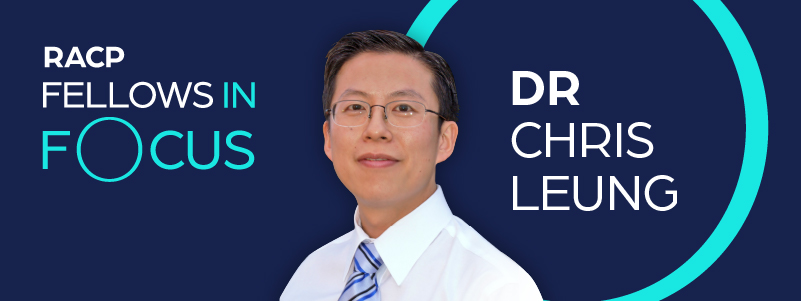RACP Fellows in Focus: Dr Chris Leung
Date published:
27 Jan 2021

What immediately strikes you about Dr Chris Leung when you meet him, is his passion and enthusiasm for his speciality.
Having originally graduated from the University of Melbourne before undertaking advanced gastroenterology training, Chris currently works as a Gastroenterologist, General Physician, Medical Lead of the Clinical Education Unit and Clinical Lead, Choosing Wisely Program at Austin Health, and a Clinical Supervisor and Academic Lead of the MD Research Program at Austin Clinical School, University of Melbourne. Chris is also a member of the RACP’s College Policy and Advocacy Council Executive Committee, as well as being a RACP Clinical Examiner, and a member of the RACP Written Exam Panel. Chris is the Executive of the Chinese Health Promotion Coalition, Past-President of the Australasian Council of Chinese Medical Associations (Auckland, New South Wales, Queensland, South Australia, Victoria) and Past-President of the Australian Chinese Medical Association (Victoria). He also previously provided endoscopic training through the World Gastroenterology Organisation.
Viral hepatitis, fatty liver disease, reflux, oesophageal manometry, interdisciplinary clinical education, virtual patients, telehealth in the COVID-19 era, make up just a few of Chris’ areas of interest. When asked why he became a specialist, he said, “a lot of doctors, when they first apply for med school, they would say they want to ‘help others’. It sounds cliché, but it's true. It really is all about our patients and our communities. What really drew me towards the RACP was the fact that whatever speciality you're in, whatever chapter you're in, you really care about people.”
Fundamentally, the reason Chris became a specialist with the RACP was that it allowed him to, “be a people-centred clinician, an educator, an advocate for our community and a researcher who is able to be at the forefront of healthcare.”
Chris’ reasons for choosing gastroenterology were plentiful. Gastroenterology is a very broad speciality and, “the breadth, the number of organ systems that gastroenterology covered, really appealed to me,” he said.
“I could see real opportunities to really advance frontiers within this field. There was a real opportunity to make a huge difference in this space. For example, hepatitis B and prevention of liver cancer, especially in the Asian population, was one topic I felt incredibly passionate about.”
When attention shifted to the skills that are required to operate as a specialist in gastroenterology, Chris mentioned the need for a “growth mindset” which he describes as, “one where we are always trying to improve ourselves” and went on to say, “I don't know if you're familiar with Star Trek? There's a humanoid-robot called 'Data' who says, "to be human is to strive to be better than who we are." And I think we can take a lot away from that.” Going on to say, “we must also remember that humans have such a fantastic ability to adapt and be resilient even during challenging times. I think that these values are probably the most valuable skills that anyone can possess.”
Having the necessary skills to keep yourself motivated and meet challenges head-on, is important, as are your influences. You need to strike a balance between the two. Chris has been fortunate enough to find this equilibrium through, “the absolutely amazing and fantastic supervisors, colleagues, trainees and students in my clinical development.” When faced with peculiarities, Chris explained, “you have to balance your work and your life. In medical practice, being a physician is amazing. The first realisation in trying to improve yourself is to remember that your home life, your family, your partner, your children, your friends, whatever your social situation, they are just as, if not more important than, what you do at work.”
When asked about what he was most proud of, without missing a beat, Chris enthused, “the ability to work with a variety of health services, organisations, universities, associations, community networks and stakeholders to make some difference in the world we live in.” Chris goes on to explain that the world in which we live needs to, “be made better for those who are suffering, those who have health problems and those who are perhaps the most vulnerable in our society. I’m proud to be part of that group that is so passionate about giving back to the communities in which we live.”
When asked about his legacy in medicine, “the legacy that I want to leave behind is that our world becomes a better place for the next generation,” Chris said.
“Our children, they are the next generation of human beings. I think we owe it to them, and we owe it to ourselves, to do as much as we can to give them a world which we have so enjoyed. Whether it’s the Jade Ribbon (hepatitis B) awareness, the RACP Evolve program, climate change advocacy, Indigenous health innovation or social justice. Hopefully, the legacy of what we all want to achieve is to improve the health of those who are the sickest in our society and are the most vulnerable. If that happens, then I guess we've done our job.”
Watch Dr Chris Leung reflect on his career journey